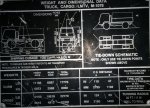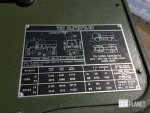coachgeo
Well-known member
- 5,220
- 3,553
- 113
- Location
- North of Cincy OH
Looking at options on mounting my Ambulance box more seriously now and talking to welder/Fabricator. Question about balance. Has anyone checked their front to back weight ratio or in a position to do so? Put up on scales at a truck stop with front axle only on scales ..... followed by back axle only on scales to see what each end carries? Id do it but seller had already removed my spare etc. so it won't be as informative.
Seems to me the truck is front heavy and if that is the case then might move up the air tanks or something up in place of the spare.... and move the spare to the back with the motorcycle as many Overlanding trucks do anyway. What are ya'lls thoughts? Granted I'll have the heavy Power Divider Box on the axle but that is unsprung weight so not as much of an equation in this.
Seems to me the truck is front heavy and if that is the case then might move up the air tanks or something up in place of the spare.... and move the spare to the back with the motorcycle as many Overlanding trucks do anyway. What are ya'lls thoughts? Granted I'll have the heavy Power Divider Box on the axle but that is unsprung weight so not as much of an equation in this.
Last edited:




